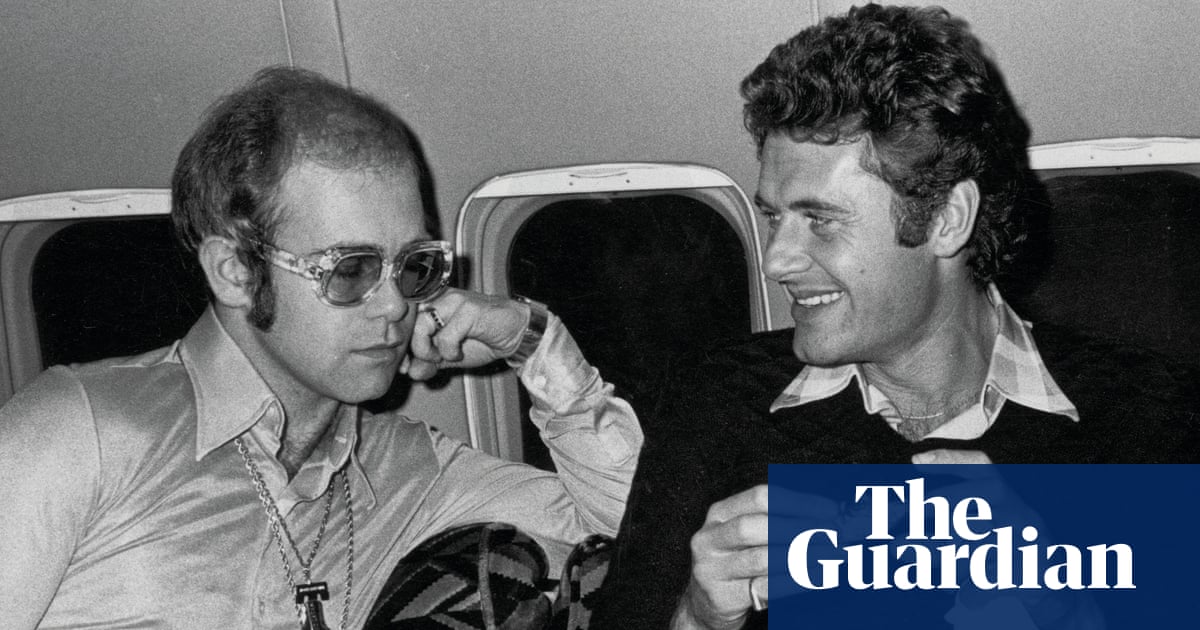
There are few couplets in pop that capture modern life’s seesaw between cynicism and hope as well as this choice gem near the end of The Overload, the forthcoming debut album from Leeds group Yard Act: “It’s all so pointless / Ah, but it’s not though, is it?” The line bares the soft underbelly of a band whose bleakly hilarious post-punk clatter channels the interior monologues of some of the country’s very worst bigots and bores, before finding unexpected humanity within them. A band who have won comparison to such caustic mavericks as Fontaines DC and Sleaford Mods, at the same time as finding themselves unlikely residents of the Radio 1 playlist and the record collection of one Elton John, who declared himself a fan in a Guardian interview.
“I’m an optimist,” insists James Smith, Yard Act’s gangly, garrulous frontman, Zooming from his Leeds bedroom and fussing with his mop of mousey hair. He knows a perverse variant of luck is on his side right now. Yard Act were a late-career roll of the dice after his previous band of nine years, Post War Glamour Girls, splintered. Then, almost as soon as Yard Act formed, Covid surfaced and venues shuttered. Still they have thrived against all odds.
Smith’s prospects weren’t always so sunny. Growing up in Lymm, near Warrington, he was a South Park-obsessed budding animator whose dreams were scotched by art teachers with whom he had “disagreements”. But as that door closed, his next youthful obsession, Gorillaz, opened Smith’s ears to pop and set him on a wayward path that took in his dad’s hip-hop records, the early 21st-century indie renaissance of the Strokes, LCD Soundsystem and Arctic Monkeys, and the poetic growling of Tom Waits.
“My world was small,” he remembers. “My ambition was to move to Leeds. I wanted to start a band, and there weren’t enough people in my town who understood what I wanted to do.” He arrived in Leeds aged 18, and found his home in the city’s “nurturing, insular DIY scene”, making friends with the other local bands and never dreaming much further than its city limits. “Most bands in Leeds aren’t bothered about breaking out, or don’t know how to,” Smith says. Post War Glamour Girls were a little of both: “We didn’t connect, for whatever reason. I was in a dark, miserable place, as most men in their early 20s are when they face life head-on and realise it’s not as fun as they thought it was gonna be.”
Smith spent his days teaching music and as a support worker for “a lad with a brain injury and cerebral palsy, who I worked with for nine years and is one of my best friends”. His evenings, meanwhile, involved post-work pints with friend Ryan Needham, the bassist in another Leeds band, Menace Beach. The pair bonded over music and more – “I just found him so funny, and I wanted to be around him all the time because he made me laugh so much,” Smith says – and when Needham became briefly homeless, Smith offered his spare room. “My wife was very accommodating and let me play music with my friend for three months and ignore her,” he grins.
It wasn’t time wasted. Smith and Needham formed Yard Act in the image of US lo-fi indie rock greats Guided By Voices. “We were just gonna get drunk, write pop songs, record them on cassettes and give ’em to friends,” Smith remembers. “But Ryan started leaning towards no wave, dance-punk basslines, and encouraged me to explore the style I’ve ended up writing in now.” That style was a spoken-word post-punk hybrid, heavy on narrative. “It’s rap music, but it’s not rap music,” he explains. “A lot of rap is first-person statements and defining who you are. My approach was conversational, and humorous. You’re putting yourself out there when you start cracking jokes. It’s a lot more nerve-racking than being po-faced and mysterious. But mystique’s never been my strong point.” Smith’s new style crystallised on Fixer Upper, Yard Act’s debut seven-inch, self-released in July 2020. An exercise in blackly comedic character observation worthy of Steve Coogan, the track showcased Smith’s new creation Graeme, a charmless, overbearing self-made man with a sideline in low-grade bigotry.
“I’ve become quite defensive over Graeme,” Smith says, adding that for many of Yard Act’s nascent fanbase Graeme was “the embodiment of everything they hate. But he’s just a bit of an idiot, really, with a lot of half-formed opinions he thinks are gospel. He’s an amalgamation of friends’ dads and men in the pub when I was growing up; they’re rife in small towns. Ultimately, if we can’t figure out how to coexist with the Graemes of the world, we’re not going to get anywhere.”
Smith says that with Yard Act he has struck a balance “between the anger and the mellowness that make me up”. That anger grew, he says “post-Brexit referendum”, as he felt “the world get harder and harder”. Perhaps trying to find the good in Graeme is his attempt to make peace with this anger? “The state of this country, and the world, can quickly get you into a spiral of Everything Is Bad,” he nods. “But it’s not. The good moments don’t exist without the bleak shit. We can’t eradicate misery and depression, we’ve got to coexist with it.
“Lately, I’ve been watching series after series of First Dates,” he continues. “People just want to find someone to love and to listen to them. Even the Graemes of the world, even the nasty bastards. And no one’s fully formed, people can change. There’s that Bill Callahan song, I’m New Here, where he says: ‘No matter how far wrong you’ve gone, you can always turn around.’ I try and apply that to everyone I meet.” He pauses. “Of course, if you’re really fucked off with someone, it’s fine to think they’re absolutely shit as well.”
Focusing on the good stuff is his medicine now, and there’s plenty for Smith to be positive about: parenthood, imminent pop stardom of some stripe and the patronage of a celebrity fan. “Maybe Elton could give Bernie Taupin a few weeks off, and I’ll send him some of my stories for his next record, and see if he can make them cinematic,” Smith grins. “Elton John, eating his breakfast, listening to Yard Act … It blows my mind, I can’t lie.”












